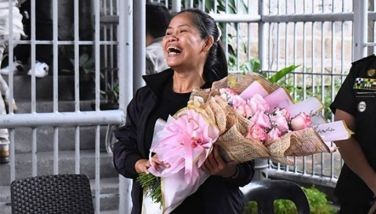Duterte unfazed by Pawa execution, wants death penalty revived
MANILA, Philippines - President Duterte’s stance on death penalty remained steadfast even as last Wednesday’s execution of 44-year-old household service worker Jakatia Pawa in Kuwait boosted the clamor against the revival of capital punishment in the country, especially for the sake of Filipinos working abroad.
Enraged by the police’s involvement in the slaying of Korean businessman Jee Ick-joo at Camp Crame last year, Duterte said he would not think twice about throwing piles of dead bodies of convicted convicts to power plants to fuel their burners.
“There is no death penalty because… if there is, they suspend it because of the Church and libertarians. I am asking for its restoration. They said that Duterte is asking for death penalty. It was there many years, many presidents ago,” the President said in his speech before investors during the groundbreaking rites of section 2 of the Sarangani Energy Corp. Power Plant.
Duterte has made no mention of Pawa’s case in his public speeches. But on his behalf, presidential spokesman Ernesto Abella issued a statement expressing sadness about Pawa’s execution and that the government tried to help save her life.
“We pray for her and her bereaved family,” Abella said.
Meanwhile, pro-life lawmakers warned yesterday death penalty revival in the Philippines would weaken the government’s plea for the lives of more overseas Filipino workers (OFWs) meted the death sentence in other countries.
Officials of the Catholic Bishops’ Conference of the Philippines echoed this sentiment, with CBCP president Lingayen-Dagupan Archbishop Socrates Villages adding that in the Philippines, more Filipinos, particularly those who have no resources to hire good lawyers to defend them in court, would face the same fate as Pawa, once the death penalty is restored in the country.
At the same time, global monitor Human Rights Watch hit the Kuwaiti government for ending a moratorium on executions by hanging seven people, including Pawa – a worrying trend, it said, of rising use of death penalty in the Middle East, where at least two million Filipinos work.
The warnings came in the wake of execution by hanging of Pawa, a native of Zamboanga, on Jan. 25 in Kuwait for reportedly stabbing to death the 22-year-old daughter of her employers while the victim was sleeping in 2007.
Reps. Harry Roque and Lito Atienza of party-lists Kabayan and Buhay, respectively, said while its campaign against illegal drugs is commendable, the Duterte government should also consider that reviving the death penalty would mean execution for more OFWs meted death by foreign governments.
“If we want to have the moral upper hand in campaigns to spare the lives of OFWs on death row in various jails abroad, we have to be consistent; we have to put our foot down on the current irrational campaign to bring back the death penalty,” Roque said.
Atienza said the President’s plan to renew judicial executions would “emasculate” in a big way the government’s efforts to redeem the lives of OFWs who are on death row abroad for ordinary offenses committed in their host countries.
“(We) would be deprived of the moral high ground when it comes to our official appeals for clemency, for foreign governments to spare the lives of our citizens who are facing execution,” the former Manila mayor said.
“How will the governments of these countries view our frantic pleas for compassion and clemency for our OFWs when they know we, ourselves, have capital punishment in our Criminal Codes?” Roque asked.
“It saddens us to say that once Congress reinstates death sentences here, and once President Duterte makes good his threat to execute five to six malefactors every day, there’s a high likelihood we would have more Jakatia Pawas,” Atienza said. “We cannot implore foreign governments to uphold universally recognized human rights, including the right to life, if we, ourselves, do not respect the sanctity of every human life.”
At least 87 Filipinos are facing the death penalty overseas, mostly in Malaysia and China, for various felonies, according to the Department of Foreign Affairs (DFA).
The 87 include 31-year-old Mary Jane Veloso, who was set to be executed by firing squad in Indonesia last year, but who obtained a last-minute reprieve after Manila asked Jakarta that she first be allowed to provide testimonial evidence against her alleged human trafficker in a Philippine criminal case.
Atienza said eight of the top 10 destinations of OFWs subscribe, on record, to capital punishment and carry out executions aggressively.
The top 10 foreign destinations of deployed land-based OFWs are Saudi Arabia, the United Arab Emirates, Singapore, Qatar, Hong Kong, Kuwait, Taiwan, Malaysia, Bahrain and Canada, according to the Philippine Overseas Employment Administration (POEA).
Of the 10, Atienza said, only Canada and Hong Kong have abolished the death penalty, while the rest are actively killing lawbreakers.
Other countries that host many OFWs and still adhere to death penalty include Jordan, Oman and Japan.
Flawed judicial system
CBCP’s Villegas likened Pawa’s fate to “the still faceless people who would be also be killed” once death penalty is revived.
“The CBCP condoles most sincerely with the family of the late Jakatia Pawa, our fellow Filipino, who was executed in Kuwait yesterday,” Villegas said.
The Catholic Church is against the revival of the death penalty, believing that innocent but poor people would be among those who would be sentenced to die because of the flaws in the judicial system and they would not have the resources to hire a good lawyer to defend them in court.
“The fact that Jakatia protested her innocence to the end of her life only underscores the abhorrence at the death penalty and the sadness that we feel with Jakatia’s death should make us all advocates against the death penalty,” Villegas said.
- Latest
- Trending






























